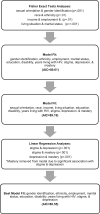Determinants of COVID-19 vaccine acceptability among older adults living with HIV
- PMID: 35945741
- PMCID: PMC9351509
- DOI: 10.1097/MD.0000000000029907
Determinants of COVID-19 vaccine acceptability among older adults living with HIV
Abstract
Since the emergency approval of several therapeutic coronavirus disease 2019 (COVID-19) vaccines in the United States, >500 million doses have been administered. However, there have been disparities in vaccine acceptability and uptake. We examined demographic, human immunodeficiency virus (HIV) disease, and psychosocial factors associated with COVID-19 vaccine acceptability in older adults (≥50 years) living with HIV in the Coachella Valley, California. Participants completed a 1-time anonymous online questionnaire assessing their demographic (i.e., age, race, education, etc), HIV disease (i.e., viral suppression, years living with HIV, acquired immunodeficiency syndrome diagnosis), psychosocial (i.e., HIV-related stigma, personal mastery, depression, etc) characteristics, and COVID-19 vaccine acceptability. Respondents were offered an electronic $20 United States dollar (USD) gift card for survey completion. Descriptive, univariable, and multivariable tests were conducted to analyze the data. Between September 2020 and February 2021, 114 surveys were completed. Eighty-six (75%) agreed/strongly agreed with the COVID-19 vaccine acceptability statement that they saw no problem with receiving a COVID-19 vaccine if one became available. Among those who agreed/strongly agreed, the mean age was 62.2 years (standard deviation = 7.20); 86% self-identified as White; 95% male; 91% with more than high school education; and 31% with annual income <$20,000 USD. Among respondents who disagreed/strongly disagreed, the mean age was 59.9 years (standard deviation = 4.85); 50% self-identified as White; 50% male; 64% with more than high school education; and 4% with annual income <$20,000 USD. In the univariable analyses, those who disagreed/strongly disagreed with the COVID-19 vaccine acceptability statement were significantly more likely to be living with HIV for fewer years, experiencing higher levels of HIV-related stigma and depression, and with lower levels of personal mastery. In the multivariable logistic regression model, self-identification as female vs male and unemployed vs employed was significantly associated with decreased COVID-19 vaccine acceptability (odds ratio = 0.09, 95% confidence interval: 0.01-0.71 and odds ratio = 0.08, 95% confidence interval: 0.01-0.70 respectively), adjusting for ethnicity, marital status, education, disability, years living with HIV, HIV-related stigma, and depression. Additional studies are needed to understand vaccine-related decision-making among older adults living with HIV. Programmatic efforts may also be necessary to disseminate accurate information/resources about COVID-19 vaccines to those with more recent HIV diagnoses, experiencing HIV-related stigma and depression, with lower levels of personal mastery, and facing socioeconomic disparities.
Copyright © 2022 the Author(s). Published by Wolters Kluwer Health, Inc.
Conflict of interest statement
The authors have no conflicts of interest to disclose.
Figures
References
-
- World Health Organization. WHO coronavirus (COVID-19) dashboard. Available at: https://covid19.who.int/ [access date April 24, 2022].
-
- Centers for Disease Control and Prevention. COVID data tracker: Daily update for the United States. Available at: https://covid.cdc.gov/covid-data-tracker/#datatracker-home [access date April 24, 2022].
-
- Centers for Disease Control and Prevention. Underlying medical conditions associated with high risk for severe COVID-19: information for healthcare providers. Available at: https://www.cdc.gov/coronavirus/2019-ncov/hcp/clinical-care/underlyingco... [access date April 24, 2022]. - PubMed
MeSH terms
Substances
Grants and funding
LinkOut - more resources
Full Text Sources
Medical


